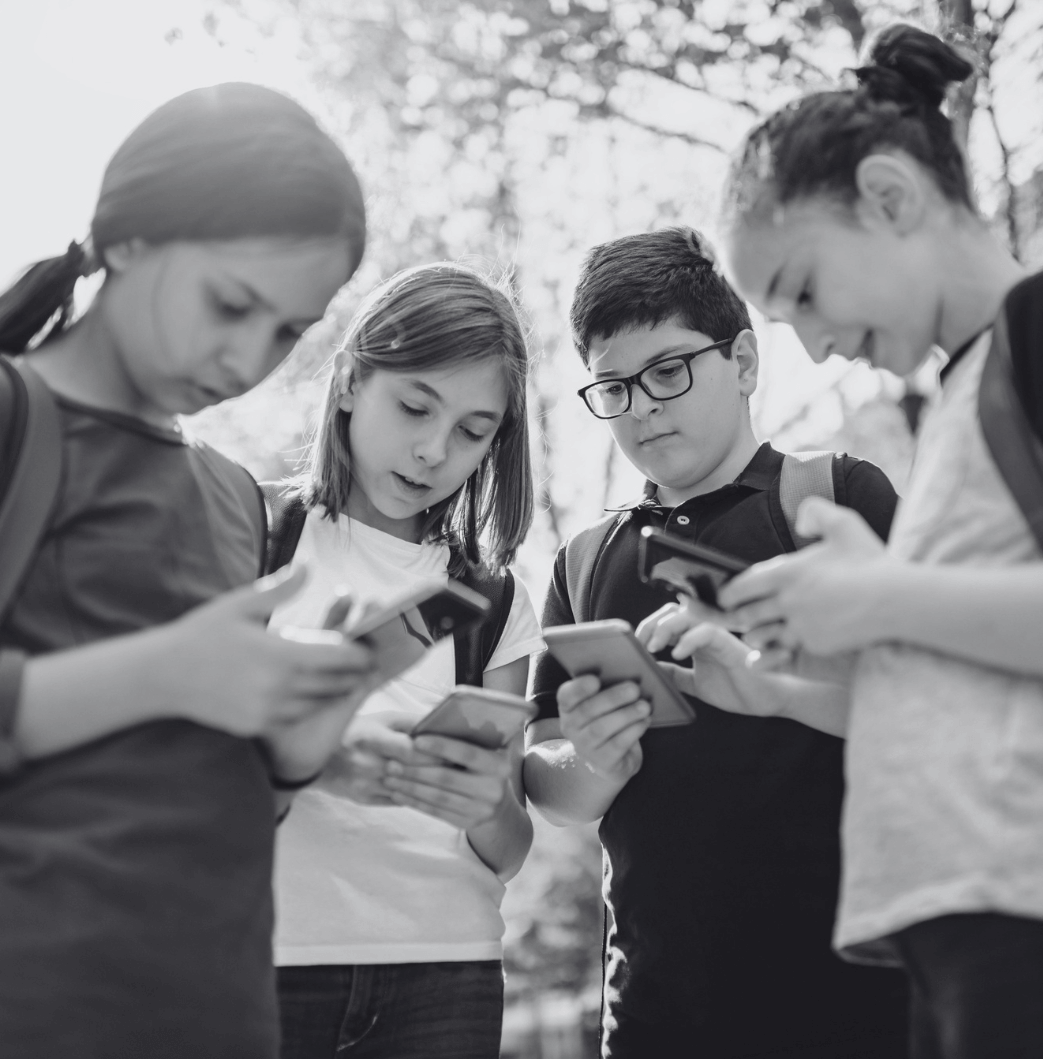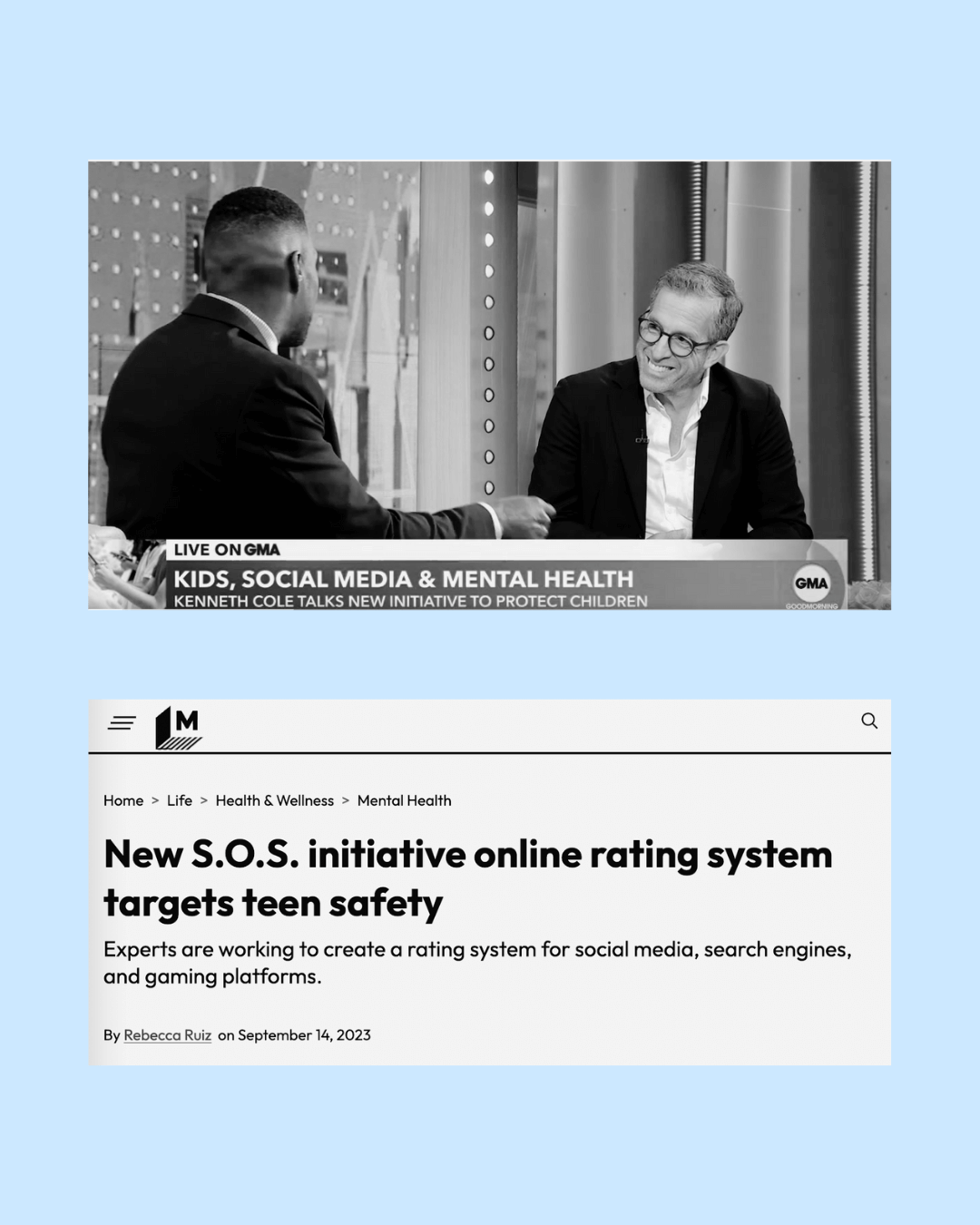If you or a friend need urgent assistance, call 911 immediately, or take your friend directly to the emergency room. If you feel it’s safe, stay with your friend, or find someone to stay with them until help arrives.
S~S
A monumental new initiative by The Mental Health Coalition


Safe Online Standards for Kids’ Mental Health
The Mental Health Coalition (MHC) is embarking on a multi-year journey to transform youth mental health in the digital space via the Safe Online Standards for Kids’ Mental Health (S.O.S.) initiative by developing credible, data-driven standards for kids’ mental health on technology platforms.
MHC’s Ambitious Timeline for S.O.S.
Phase I
Build Foundation
Define and develop initial set of standards
Outcome: An initial set of S.O.S. standards, endorsed by experts and informed by users
Phase II
Test & Implement
Pilot Standards and Implement Industry-Endorsed Standards at Scale
Outcomes: Tested and implementable S.O.S. standards adopted by many social media companies; Publicly accessible ratings for social media platforms used by parents, kids, and educators
Phase III+
Sustain & Expand
Operate and Maintain Standards and Expand
Outcome: Sustainable implementation of the ratings and supporting standards with widespread adoption and measurable impact on kids’ mental health
RESULT
Create the first-ever standards and ratings for kids’ mental health and social media to catalyze healthful engagement for kids online
Leaders driving the standards development workstream:
Expert Panel
Creates standards around mental health and social media
David Bickham, Ph.D.
Research scientist at Boston Children’s Hospital’s Digital Wellness Lab
Richard Cullata, M. ID.
CEO of International Society for Technology & Education, author of Digital for Good
Darja Djordjevic, M.D, Ph.D.
Academic/Research ChiefFellow, Child and Adolescent Psychiatry, NUMC, NY
Rita Fabi
Trust and Safety Consultant, Tech Coalition
Michael Johnson, M.A., CAP
Managing Director of Beh. Health at CARF
Pippa Kennard
Program Manager, Stanford Mental Health Tech + Innovation Hub, Stanford University, School of Medicine, Department of Psychiatry & Behavioral Sciences
Matt Nock, Ph.D.
Psychologist, Dir of the Laboratory for Clinical and Developmental Research at Harvard University
Denny Morrison, Ph.D.
Fmr Chief Clinical Officer of Netsmart, expert in intersection of clinical work in behavioral health and technology
Jacqi Nessi, Ph.D.
Assistant Professor of Psychiatry and Human Behavior at Brown University
Mitch Prinstein, Ph.D.
Chief Science Officer American Psychological Association (APA)
Jo Robinson, Ph.D.
Professor Orygen Australia, Head of Suicide Research
Steven Schueller, Ph.D
Associate Professor of Psychological Science and Informatics at the University of California, Irvine
Nina Vasan, M.D.
Psychiatrist, Professor of Psychiatry at Stanford, Founder and Executive Director of Brainstorm
Shairi Turner, M.D., MPH
Chief Health Officer, Crisis Text Line
Steering Committee
Provides oversight, advice, guidance and feedback on standards development and standards
Carolyn Bunting
CEO of Internet Matters
Kana Enomoto
Director of Brain Health, McKinsey Institute, Fmr Asst Sect. for Mental Health and Substance Use SAMHSA
Tom Insel, M.D.
Former director of NIMH
Harold Koplewicz, M.D.
Founding President and Medical Director of the Child Mind Institute, Senior child and adolescent psychiatrist
Larry Magid
CEO of ConnectSafely
Jennifer Mineer
Executive Director of My Digital TAT2
Linda Papadapolous, BPS
Psychologist, author, psychodermatologist, and podcaster/influencers
Matt Pitman, Ph.D.
Assistant Professor, School of Advertising and Public Relations, University of Tennessee
Press Coverage of S.O.S.


Making Headlines
Good Morning America
MHC Founder Kenneth Cole sat down with Good Morning America to discuss the Coalition’s new S.O.S. initiative.
WATCH THE SEGMENT
Mashable
Senior Reporter Rebecca Ruiz covered the news for Mashable: “New S.O.S. initiative online rating system targets teen safety.”
READ THE ARTICLE
Why Now?
While being online has plenty of benefits, any technology used by our kids with such potency and frequency during such an influential time in their development demands our serious attention.
To date, there are no independent standards to guide young people’s online and social media experiences that put their health and well-being first. We have left parents and teens to fend for themselves when it comes to a highly influential but largely unregulated and fully ubiquitous industry.
While there may be many things that impact the emotional, social, and intellectual well-being of teens, the ever-worsening mental health outcomes for teens demand that we put in place standards that support their mental health for an industry that plays such an outsized role in their lives.
The US Surgeon General has issued a public advisory highlighting this critical moment in time. If we don’t act now, history will judge us accordingly. We must create a responsible framework that defines and distinguishes harmful from healthful social media experiences; standards that can be accessed by all stakeholders, starting with youth.
LEARN MORE
Interested in learning more about this important work?
For inquiries about the S.O.S. goal, process, or committee, contact Dr. Dan Reidenberg or Linda Lurie Mars, Project Manager.
For press inquiries, contact Amanda Roston.
The Mental Health Coalition (MHC) is a collective of organizations working to destigmatize mental health and empower access to vital resources and necessary support for all. MHC members collaborate and align synergies to create even greater outcomes than they could individually. MHC has independent efforts in addition to the Coalition’s collaborative programs, including Safe Online Standards (SOS) and more.
Any content or resources linked to a specific organization, brand, or individual will be credited as such. MHC values our members’ work and commitment to mental health; however, being a member of the Coalition does not imply or suggest that MHC endorses every aspect of their work. Information or content published by MHC is not representative of Coalition members unless specified.